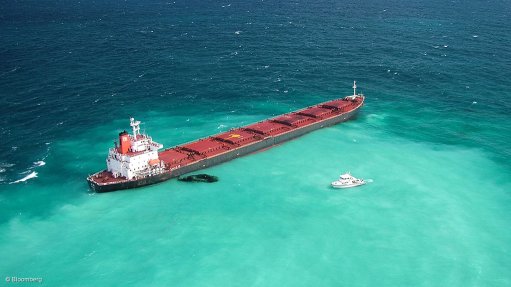
Photo by: Bloomberg
PERTH (miningweekly.com) – The Australian government would commit an additional A$100-million in new funding for the Reef Trust to support the implementation of the Reef 2050 long-term sustainability plan, Prime Minister Tony Abbott announced over the weekend.
The Reef 2050 long-term sustainability plan is the overarching framework for protecting and managing the Great Barrier Reef from 2015 to 2050.
The latest funding would be in addition to the A$40-million initially used to establish the Reef Trust.
Abbott noted that the additional A$100-million would be used to tackle key challenges facing the reef, in particular projects to improve water quality, building on the commonwealth government’s total and permanent ban on the dumping of capital dredge spoil in the Great Barrier Reef Marine Park.
The Prime Minister stated that recent decisions would also see zero capital disposal anywhere in the entire 345 000 km2 marine park, and along with the 3 000 km2 dumping ban instituted by the Queensland government, would cover 100% of the World Heritage area.
Meanwhile, Abbott also announced the appointment of Commonwealth chief scientist Professor Ian Chubb to chair an independent scientific panel to advise on funding priorities for the A$140-million Reef Trust to assist with qualitative monitoring on achieving targets under the Reef 2050 plan, as well as the overarching vision to improve the outstanding universal value of the reef every decade between now and 2050.
The Queensland Resources Council (QRC) has welcomed the release of the Reef 2050 plan, saying it demonstrated the results of the hard work that had been undertaken, including by the resources and ports sectors, since the United Nations Educational, Scientific and Cultural Organisation’s (Unesco’s) initial Reactive Monitoring Mission visit in 2012.
“The plan raises an already high regulatory bar even higher for the resources and ports sectors, and in the case of some of the restrictions on dredging, will inevitably mean that over time some necessary port projects in Queensland will not be able to proceed,” QRC CEO Michael Roche said.
He noted that the official launch of the Reef 2050 plan was the last major milestone in a long list of requirements set out by Unesco’s World Heritage Committee.
“The plan will demonstrate to the 21-member countries of the World Heritage Committee that Australia (and Queensland) has a strong and comprehensive plan to protect the intrinsic outstanding universal value of the reef, while recognising the economic importance of the industries operating in and near the reef.”
Unesco’s World Heritage Committee was set to consider an ‘in-danger’ listing for the Great Barrier Reef in June this year, and Roche warned that if approved, this could lead to difficult times for the industry in Queensland.